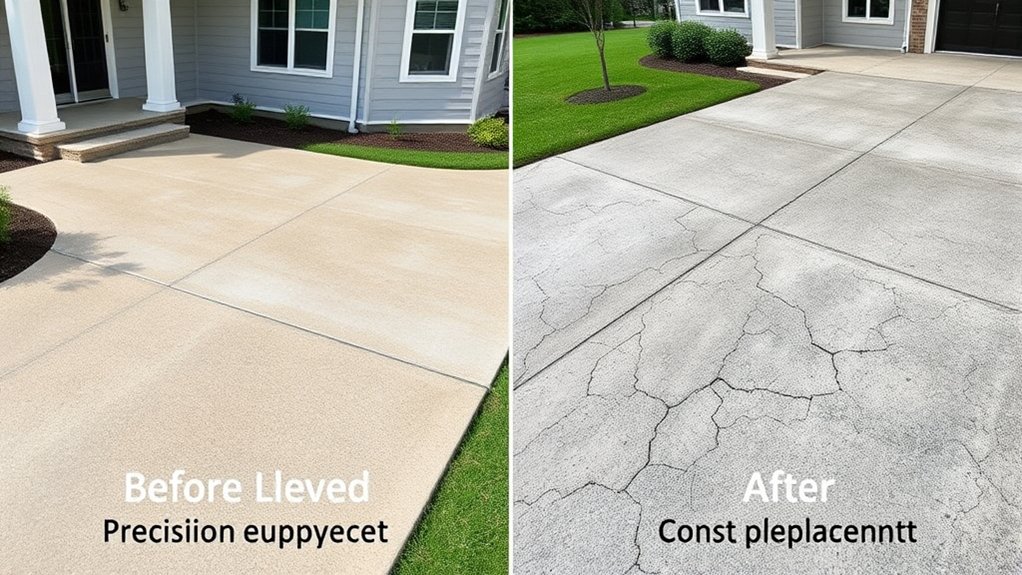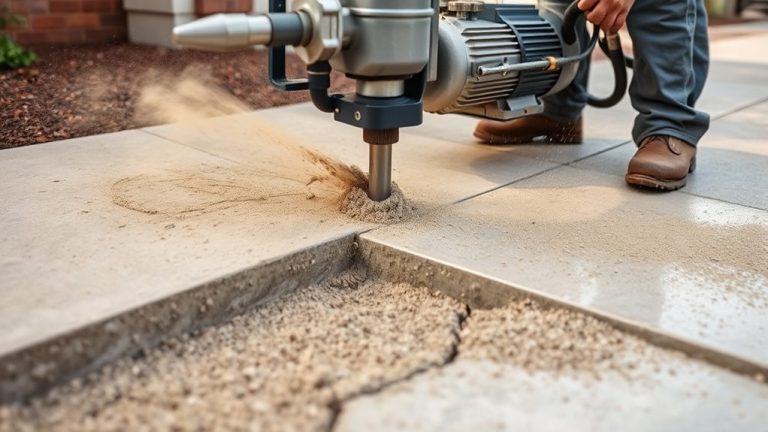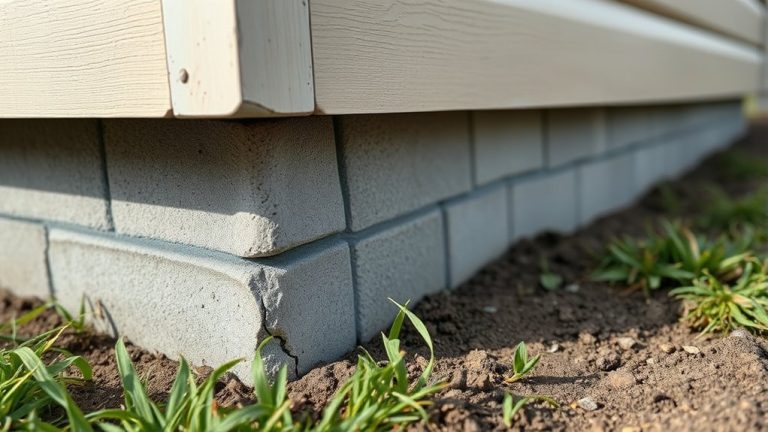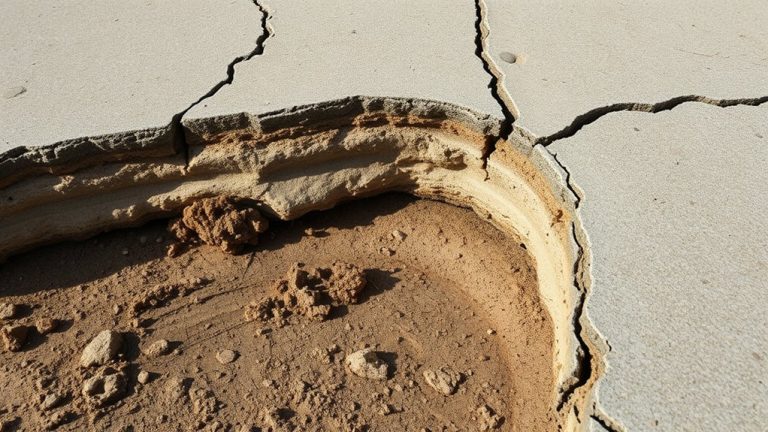When concrete damage threatens your property's foundation, you're faced with a critical decision: repair or replace? It's a dilemma that can quickly drain your wallet if you're not cautious. Concrete leveling might be the smart solution you've been seeking, offering significant cost savings and minimal interference. But how can you be certain it's the right choice for your specific situation? Let's reveal the facts that could save you thousands.
Key Takeaways
- Concrete leveling costs 50-70% less than full replacement, offering significant savings on materials, labor, and property disruption.
- Professional assessment of damage extent determines the most cost-effective repair strategy, potentially preventing unnecessary total replacement.
- Leveling techniques restore structural integrity faster and with minimal terrain disruption, reducing overall project expenses and time.
- Long-term benefits include extended concrete durability, reduced future repair costs, and maintaining property value without extensive reconstruction.
- Factors like concrete condition, surface area, location, and accessibility directly impact repair expenses, making leveling often the more economical choice.
Understanding the Basics of Concrete Damage
When concrete surfaces start to show signs of wear and damage, homeowners often feel frustrated and overwhelmed by potential repair options. Soil erosion patterns and drainage system issues can cause uneven settling, leading to cracks, sinking, and structural problems. Foundation inspections can help identify early signs of damage before they escalate into more serious structural issues. You'll notice these damages through visible fractures, uneven surfaces, or water pooling around your concrete areas. Understanding the root causes helps you make informed decisions about repair strategies. Professional assessment can reveal whether minor leveling techniques or complete replacement might be necessary, potentially saving you significant time and money in the long run.
Cost Comparison: Leveling vs. Full Replacement
Every homeowner wants a cost-effective solution when dealing with concrete damage, and comparing leveling versus full replacement can reveal significant financial differences. Leveling typically costs about 50-70% less than complete replacement, making it a budget-friendly option for most property owners. You'll save money on materials, labor, and disturbance to your property. Foundation repair experts in Syracuse recommend evaluating your specific concrete damage to determine the most appropriate and economical solution for your property.
Full replacement requires extensive work, heavy equipment, and complete removal of existing concrete. In contrast, concrete leveling uses specialized techniques to lift and stabilize damaged surfaces, providing cost-effective solutions that restore your concrete's functionality without breaking the bank.
Factors Affecting Repair and Replacement Expenses
While cost is a primary concern for many homeowners, the expenses associated with concrete repair or replacement aren't uniform across all projects. Several key factors influence your potential spending.
Repair material costs can vary widely depending on the concrete's condition, damage extent, and surface area needing attention. Labor requirements also considerably impact your total project expenses, with skilled professionals charging different rates based on complexity and time needed.
Your location, the specific concrete type, and accessibility of the damaged area will further shape the overall financial investment required for restoring your concrete surface.
Long-Term Benefits of Concrete Leveling
Because concrete leveling offers numerous advantages over complete replacement, homeowners can enjoy significant long-term benefits that extend far beyond immediate repair needs. You'll save money through extended durability and cost-effective maintenance that preserves your property's structural integrity.
Instead of tearing out and reinstalling concrete, leveling allows you to quickly restore uneven surfaces without extensive alteration. This approach not only reduces overall expenses but also minimizes terrain disruption and provides a faster solution to potential safety hazards.
Your concrete will look better and remain stable for years to come.
Choosing the Right Solution for Your Property
When determining the most appropriate concrete repair strategy, homeowners must carefully assess multiple factors that influence their specific property's needs. Your decision impacts property value improvement and long-term structural integrity.
Consider these critical evaluation points:
- Current concrete damage extent
- Soil stabilization requirements
- Budget constraints and financial flexibility
You'll want to balance immediate repair costs with potential future expenses. Concrete leveling often offers a more cost-effective solution compared to full replacement, preserving your property's foundational strength while minimizing disruption.
Frequently Asked Questions
How Long Does Concrete Leveling Take Compared to Full Replacement?
You'll complete concrete leveling in hours, while replacement takes days. With shorter completion time and lower labor costs, you'll save time and money by choosing the quicker leveling option.
Can I Perform Concrete Leveling as a DIY Project?
You can DIY concrete leveling, but it's challenging. You'll need precise DIY concrete mixing techniques and careful DIY concrete curing methods. Your success depends on skill level, tools, and willingness to tackle a technical project.
Will Concrete Leveling Fix Large Cracks in My Driveway?
Concrete leveling won't completely fix large cracks, but it'll help identify root causes and improve your driveway's appearance. It's a quick solution that'll restore surface evenness and prevent further damage.
Does Concrete Leveling Work on All Types of Surfaces?
Concrete leveling works on polished concrete surfaces and uneven sidewalk sections, giving you the power to restore and level various concrete areas without complete replacement, saving you time and money.
How Soon Can I Use the Concrete After Leveling?
You'll typically wait 24-48 hours after leveling before using the concrete. Follow recommended preparation steps, allow proper curing time, and you'll guarantee a durable, stable surface that's ready for your next move.



